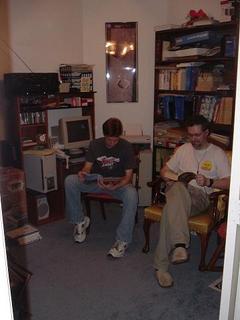Philosophical Worldviews
So I ordered the textbook for the Research Methods class and am reading through it before my Public Policy class begins (Research Design: Qualitative, Quantitative, and Mixed Methods Approaches, by John Creswell). In this textbook Creswell mentions four Philosophical Worldviews the different researchers may or may not have. He says that it is important to figure out your worldview before you start designing your research project so that you can use the best research methods that will complement your philosophical outlook.
I found out that I have two different outlooks depending upon what type of paper I am writing. As a Historian I have what Creswell calls the Social Constructive worldview. I look at the society and individuals in the time period without preconceptions and try to figure out what was going on way back when, understanding that different societies have different worldviews themselves. When I am working on a Political Science paper I realize that I am what Creswell calls a Pragmatist; more concerned with finding out what works in a messy world, than worried about creating a theory that fits all the facts. I then find out that Rorty (a philosopher favored by Andrew) has written about Pragmatism, and I should use this occasion to learn more about Rorty and Pragmatism.
Perhaps Andrew has a reading list for me.









 This is a collection of essays, journal articles, and other of Rorty's writings that bring forth a very accessable introduction to his philosophy. He brings together continental philosophy and true leftist American thought (has anyone else noticed that 'the left' today is what 'moderate' was not that long ago?... if politics is your game check out his book Achieving our Country). Rorty would classify himself as a neo-pragmatist although few people call him anything other than a post-modernist. He has a flare for story-telling at times which lightens the heavy intellectual-elitist feel that can creep up among the plethora of references he makes to other writers/works/ideas in philosophy and every other field. His top three influences are John Dewey [Democracy and Education], Charles Darwin [The Origin of Species, as if you didn't know], and Thomas Kuhn [The Structure of Scientific Revolutions]. Rorty is my current favorite, and if it wasn't clear from the title of his book, he is a hardcore optimist just like me.
This is a collection of essays, journal articles, and other of Rorty's writings that bring forth a very accessable introduction to his philosophy. He brings together continental philosophy and true leftist American thought (has anyone else noticed that 'the left' today is what 'moderate' was not that long ago?... if politics is your game check out his book Achieving our Country). Rorty would classify himself as a neo-pragmatist although few people call him anything other than a post-modernist. He has a flare for story-telling at times which lightens the heavy intellectual-elitist feel that can creep up among the plethora of references he makes to other writers/works/ideas in philosophy and every other field. His top three influences are John Dewey [Democracy and Education], Charles Darwin [The Origin of Species, as if you didn't know], and Thomas Kuhn [The Structure of Scientific Revolutions]. Rorty is my current favorite, and if it wasn't clear from the title of his book, he is a hardcore optimist just like me.
